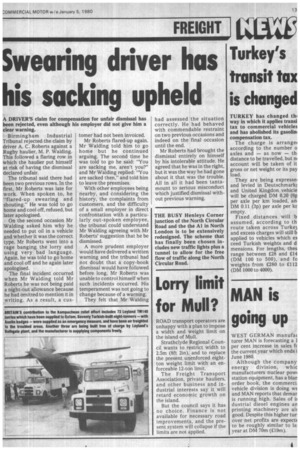Swearing driver has his sacking upheld
Page 15

If you've noticed an error in this article please click here to report it so we can fix it.
A DRIVER'S claim for compensation for unfair dismissal has been rejected, even although his employer did not give him a clear warning.
Birmingham Industrial Tribunal rejected the claim by driver A. C. Roberts against a Rugby haulier, M. P. Walding. This followed a flaring row in which the haulier put himself at risk of having the dismissal declared unfair.
The tribunal said there had been two previous rows. In the first, Mr Roberts was late for work. When spoken to, he "flared-up swearing and shouting." He was told to go home and cool off, refused, but later apologised.
On the second occasion Mr Walding asked him why he needed to put oil in a vehicle and whether it was the correct type. Mr Roberts went into a rage banging the lorry and using very bad language. Again, he was told to go home and cool off and he again later apologised.
The final incident occurred when Mr Walding told Mr Roberts he was not being paid a night-out allowance because he had omitted to mention it in writing. As a result, a cus tomer had not been invoiced.
Mr Roberts flared-up again. Mr Walding told him to go home but he continued arguing. The second time he was told to go he said: "You are sacking me, aren't you?" and Mr Walding replied: "You are sacked then," and told him to leave the presmises.
With other employees being nearby, and considering the history, the complaints from customers, and the difficulty of a small employer in direct confrontation with a particularly out-spoken employee, the tribunal could understand Mr Walding agreeing with Mr Roberts' suggestion that he be dismissed.
A more prudent employer would have delivered a written warning and the tribunal had not doubt that a copy-book dismissal would have followed before long. Mr Roberts was unable to control himself when such incidents occurred. His temperament was not going to change because of a warning.
They felt that Mr Walding had assessed the situation correctly. He had behaved with commendable restraint on two previous occasions and indeed on the final occasion until the end.
Mr Roberts had brought the dismissal entirely on himself by his intolerable attitude. He agreed that he was in the right, but it was the way he had gone about it that was the trouble. All in all it had been tantamount to serious misconduct which justified dismissal without previous warning.
















































































